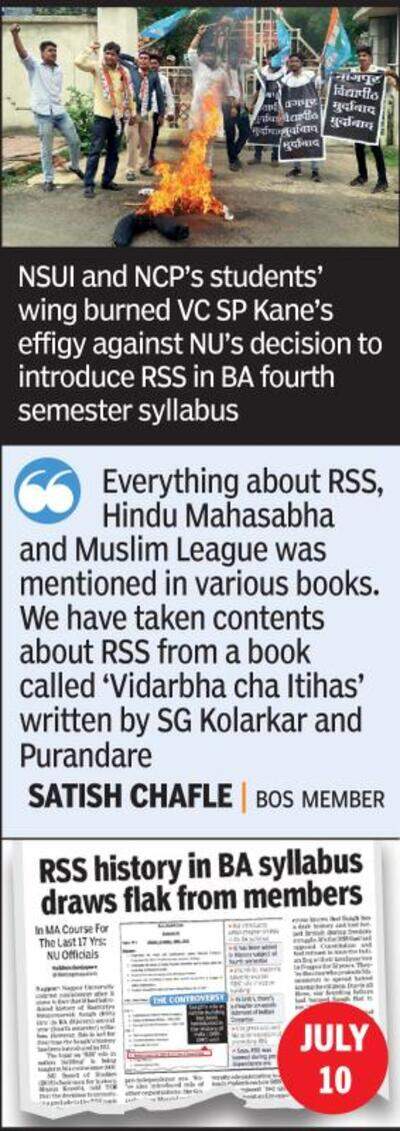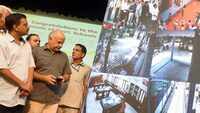
Nagpur: Even as protest continued against Nagpur University’s decision to introduce chapter on Rashtriya Swayamsevak Sangh (RSS) chapter into its BA (History) syllabus, those who actually framed it are surprised over the entire fuss, terming it as “unwarranted”. Earlier in the day, the NSUI and NCP’s students’ wing burned vice chancellor SP Kane’s effigy against NU’s decision to introduce RSS in BA fourth semester syllabus.
According to Board of Studies (BOS) members, not only NU, but many other big universities like Delhi (DU) and Mumbai and Burdwan University in West Bengal, too have chapters where Sangh’s role during pre-independence era was mentioned. Even neighbouring Gondwana University has a topic on the saffron organization’s contribution to the freedom struggle in its MA (History) syllabus, just like NU.
“Sangh’s role is not introduced for the first time as speculated by the media. It was in the BA syllabus for many years under the topic of ‘Rise and growth and communalism’. Along with RSS, there is also a mention of Hindu Mahasabha and Indian Muslim League’s role in the freedom struggle,” NU BOS chairman for history, Shyam Koretti told TOI.
He said when NU had yearly pattern, names of all such organizations that played a significant role in the freedom’s struggle were included in the chapter ‘Rise and growth of communalism’. “After semester pattern, the syllabus is divided into two parts and therefore, we divided this entire chapter and had included topic on RSS in fourth semester. The students could study the topic only next year when this batch would progress to next semesters,” Koretti said.
Other BOS members and NU officials refuted any possibility of removing the chapter on RSS from the syllabus after facing flak from many quarters, particularly from the non-saffron parties like Congress and NCP. “The framing of syllabus is a complicated process. First, the BOS members finalize it after many deliberations. Later, the faculty concerned clears it. It is then finally cleared by the Academic Council, which is a statutory body. The administration has absolutely no role to play in it, as syllabus framing is the experts’ job carried out by the academicians in respective fields,” they said.
According to BOS members, they had introduced a small portion of RSS history from 1925, when it was founded, to 1947, when India achieved independence. “We haven’t included anything on our own. Everything about RSS, Hindu Mahasabha and Muslim League was mentioned in various books. We have taken contents about RSS from a book called ‘Vidarbha cha Itihas’ written by SG Kolarkar and Purandare. There’s nothing controversial in any of the chapters in syllabus,” BOS member Satish Chafle told TOI.
He added that the BOS had taken care to include contribution of various organizations into Vidarbha’s development during the freedom struggle and RSS role can’t be denied. “Our body of 11 members, where there are experts from Nanded, Jalgaon and other universities have fixed contents after lots of discussions. All of them are subject experts and they can’t introduce out of the way. Unnecessarily, the controversy is being created. We’ve also introduced chapters on Wakatak period in Vidarbha, but no one talks about it,” Chafle said.
Contents of Chapter on History of Modern India:
* Unit 1a:
-- Formation and Administration of Central Provinces and Berar
-- Sarvajanik Sabha, Gorakshan Sabha, Educational Institutions
-- Congress Sessions — 1891,1897,1920
* Unit 2a:
-- Non Cooperation Movement, Civil Disobedience Movement
-- Quit India Movement — Ashti, Chimur, Yawli
-- First Congress Ministry under Dr. N.B. Khare
* Unit 3a:
-- Separate Vidarbha Movement
-- Dalit Movement
-- Samyukta Maharashtra Movement
* Unit 4a:
-- Social Welfare Activities — Missionary Work, Matru Seva Sangh, Anandwan, Gurudev Seva Mandal
-- Rashtriya Swayamsevak Sangh (RSS)
-- Dhamma Chakra Pravartan
According to Board of Studies (BOS) members, not only NU, but many other big universities like Delhi (DU) and Mumbai and Burdwan University in West Bengal, too have chapters where Sangh’s role during pre-independence era was mentioned. Even neighbouring Gondwana University has a topic on the saffron organization’s contribution to the freedom struggle in its MA (History) syllabus, just like NU.
“Sangh’s role is not introduced for the first time as speculated by the media. It was in the BA syllabus for many years under the topic of ‘Rise and growth and communalism’. Along with RSS, there is also a mention of Hindu Mahasabha and Indian Muslim League’s role in the freedom struggle,” NU BOS chairman for history, Shyam Koretti told TOI.
He said when NU had yearly pattern, names of all such organizations that played a significant role in the freedom’s struggle were included in the chapter ‘Rise and growth of communalism’. “After semester pattern, the syllabus is divided into two parts and therefore, we divided this entire chapter and had included topic on RSS in fourth semester. The students could study the topic only next year when this batch would progress to next semesters,” Koretti said.
Other BOS members and NU officials refuted any possibility of removing the chapter on RSS from the syllabus after facing flak from many quarters, particularly from the non-saffron parties like Congress and NCP. “The framing of syllabus is a complicated process. First, the BOS members finalize it after many deliberations. Later, the faculty concerned clears it. It is then finally cleared by the Academic Council, which is a statutory body. The administration has absolutely no role to play in it, as syllabus framing is the experts’ job carried out by the academicians in respective fields,” they said.
According to BOS members, they had introduced a small portion of RSS history from 1925, when it was founded, to 1947, when India achieved independence. “We haven’t included anything on our own. Everything about RSS, Hindu Mahasabha and Muslim League was mentioned in various books. We have taken contents about RSS from a book called ‘Vidarbha cha Itihas’ written by SG Kolarkar and Purandare. There’s nothing controversial in any of the chapters in syllabus,” BOS member Satish Chafle told TOI.
He added that the BOS had taken care to include contribution of various organizations into Vidarbha’s development during the freedom struggle and RSS role can’t be denied. “Our body of 11 members, where there are experts from Nanded, Jalgaon and other universities have fixed contents after lots of discussions. All of them are subject experts and they can’t introduce out of the way. Unnecessarily, the controversy is being created. We’ve also introduced chapters on Wakatak period in Vidarbha, but no one talks about it,” Chafle said.
Contents of Chapter on History of Modern India:
* Unit 1a:
-- Formation and Administration of Central Provinces and Berar
-- Sarvajanik Sabha, Gorakshan Sabha, Educational Institutions
-- Congress Sessions — 1891,1897,1920
* Unit 2a:
-- Non Cooperation Movement, Civil Disobedience Movement
-- Quit India Movement — Ashti, Chimur, Yawli
-- First Congress Ministry under Dr. N.B. Khare
* Unit 3a:
-- Separate Vidarbha Movement
-- Dalit Movement
-- Samyukta Maharashtra Movement
* Unit 4a:
-- Social Welfare Activities — Missionary Work, Matru Seva Sangh, Anandwan, Gurudev Seva Mandal
-- Rashtriya Swayamsevak Sangh (RSS)
-- Dhamma Chakra Pravartan
World Cup 2019
Trending Topics
LATEST VIDEOS
More from TOI
Navbharat Times
Featured Today in Travel
Quick Links
Lok Sabha Election Schedule 2019Lok Sabha Election NewsDelhi Capitals teamMI team 2019Rajasthan Royals 2019RCB team 2019Maharashtra Lok Sabha ConstituenciesBJP Candidate ListBJP List 2019 TamilnaduShiv Sena List 2019AP BJP List 2019Mamata BanerjeeBJP List 2019 MaharashtraPriyanka GandhiBJP List 2019 KarnatakaAMMK Candidate List 2019BJP List 2019 WBLok Sabha Elections in Tamil NaduBSP List 2019 UPNews in TamilLok Sabha Poll 2019Satta Matka 2018PM ModiMahagathbandhanNagpur BJP Candidate ListChandrababu NaiduTamil Nadu ElectionsUrmila MatondkarNews in TeluguMadras High CourtTejashwi YadavArvind KejriwalTejasvi SuryaPawan KalyanArvind KejriwalYogi AdityanathJaya PradaSatta King 2019Srinagar encounter
Get the app







